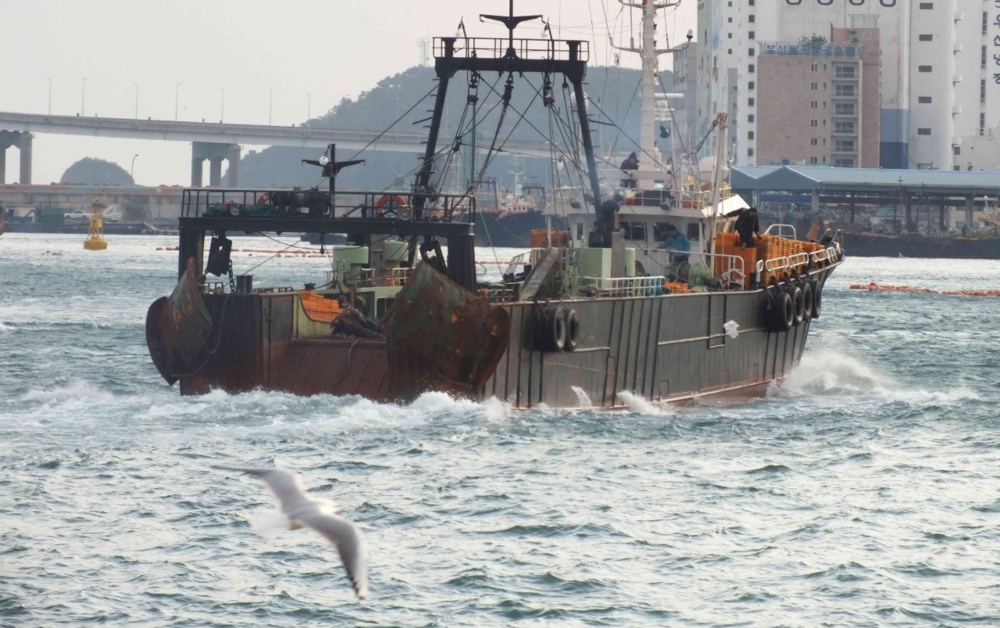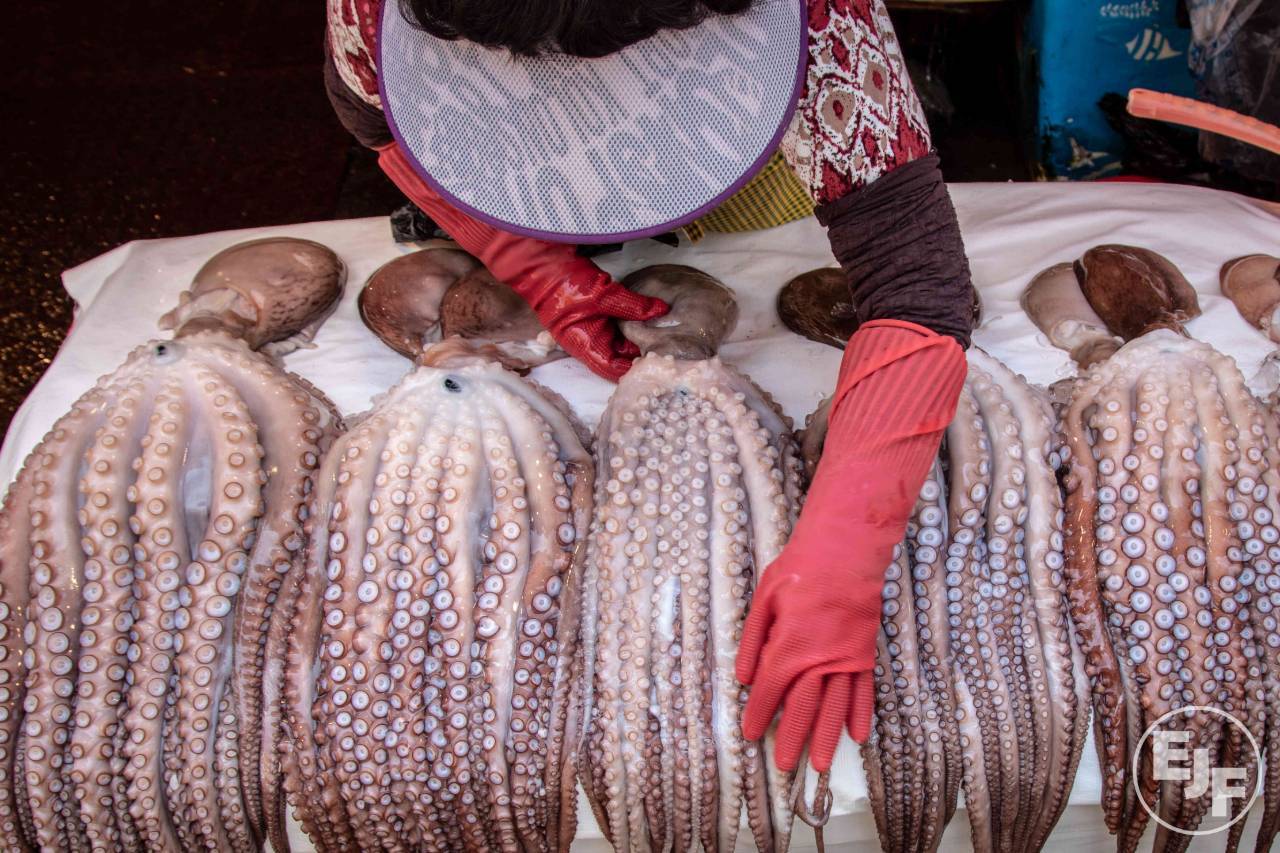
Abuse of migrant workers and illegal fishing on Korean vessels exporting to the EU
Migrant workers in Korea’s distant water fishing fleet report frequent physical and verbal abuse and punishing working hours, an 18-month joint investigation by the Advocate for Public Interest Law (APIL) and the Environmental Justice Foundation (EJF) has revealed. Former fishers also allege that some vessels regularly operate illegally, including intentionally catching marine mammals.
29 of the 40 vessels investigated are authorised to export to the EU and UK, and crew from some of those vessels reported violent attacks and illegal activities. The Korean distant water fleet exports tens of millions of dollars worth of seafood to the USA and Europe every year, raising serious concerns for suppliers, retailers and consumers in these countries. EJF and APIL are calling for urgent reforms to improve transparency in the sector to protect migrant workers and end illegal fishing.
Of the 54 Indonesian former crew interviewed, over a quarter reported experiencing physical abuse, with 63% witnessing verbal abuse. All but two of those interviewed were made to work more than 12 hours a day without a break, with over half working in excess of 18 hours a day. Almost all reported that their passports were confiscated by their captain and several months wages deducted at the start of contracts to discourage them from escaping these abusive environments.
EJF and APIL have investigated the activities of the Korean fishing fleet since 2018. It is one of the world’s largest distant water fishing fleets, with over 219 vessels operating around the globe.
An Indonesian fisher from a Korean trawler told EJF, “When unloading fish, we need to get into the freezer, and it is very cold, even after we put on three layers of coats, we are still freezing. Since the freezer is very cold, we need to get out a bit to get some warmth and avoid getting frozen, but the supervisor will slap or hit us if we do that.”
In addition to the abusive treatment of crew, a third of the vessels were accused of fishing illegally – including operating in unauthorised areas and targeting marine mammals. Another worker from a vessel that targeted squid said “When [fishing illegally], we got loads of fish, sometimes we have to work two days two nights without sleeping.” He added that “the captain, supervisor and Korean crews caught seals too, they took teeth, genitals and liver to eat. During [the] six months operating, the vessel caught about 200 seals.”
The alleged abuse took place under an almost complete absence of government oversight. Korean longliners spend the most time at sea, travel the furthest and fish the longest hours, according to research conducted at the University of California, Santa Barbara. Vessels regularly remain at sea for over a year, and in some cases over 18 months, without calling at port. Labour inspections are almost never conducted on the rare occasions when vessels return to Korea, and there are no Korean labour inspectors assigned to overseas ports.
29 of the 40 vessels examined in the investigation have been certified to export fish to the EU and the UK. On one such vessel that targeted squid, there were reports of violent attacks on migrant workers, in one case resulting in a broken nose. It was also alleged that the same vessel required working hours of up to 20 hours a day and illegally caught and processed seals and walruses.
Across all the EU-certified vessels, former crew from six vessels claimed they experienced physical abuse, such as beatings, and verbal abuse was commonplace, and reported from 20 of the vessels. Working days of at least 18 hours were reported from 16 of the vessels and 12 were alleged to have engaged in illegal fishing.
The Korean distant water fishing fleet exported US$ 39 million of seafood to the USA in 2018. Over the last decade, Korea has been formally warned by the EU on one occasion and the USA on two occasions to address illegal, unreported and unregulated fishing in its fleet.
This means there is a risk that seafood caught by abused workers is finding its way to supermarket shelves across the world. Retailers and suppliers must urgently review their supply chains to ensure that they eradicate any trace of human rights abuse or illegal fishing, say EJF and APIL.
APIL and EJF are calling for urgent reforms designed to address the issues described by former crew. The Korean government must make a firm commitment to transparency in the sector by undertaking to EJF’s ten basic principles in its Charter for Transparency. These include ratification of the International Labour Organization’s Work in Fishing Convention (ILO C188), a new inspection regime conducted by officials trained in adopting a victim-based approach, and the mandatory installation of cameras on vessels to monitor what they catch.
APIL’s Attorney JongChul Kim said: “Many of the vessels whose former workers alleged human rights abuses are certified to export to EU and UK, and Korea exports tens of millions of dollars worth of seafood to the USA every year. Companies and countries across the world should take urgent action to ensure that they are not funding human rights abuses in their seafood supply chains. At the same time, the government of Korea should immediately improve its regulations and enhance monitoring of distant water fishing vessels, including through ratifying ILO 188 and introducing regular labor inspections.
The Executive Director of EJF, Steve Trent said: “Declines in global fish stocks are leading many operators to mistreat their workers and fish illegally in order to cut costs and maximise profits. The scale of the serious problems we found in the Korean fleet demand immediate attention. To bring distant water fishing vessels out of the shadows, Korea should move quickly to require the use of cameras so that authorities can monitor what is being caught. To protect migrant fishers from human rights abuses, Korean law should be brought in line with international best practice through the ratification of ILO C188.”
Notes for editors
The Advocates for Public Interest Law (APIL) is a non-governmental, non-profit public interest lawyers’ organization that was established in 2011. APIL seeks to defend the human rights of refugees, victims of human trafficking, stateless persons, migrants who have been detained for prolonged periods and victims of human rights violations committed by Korean corporations abroad.
The Environmental Justice Foundation is an international non-governmental organisation working to protect the environment and defend human rights. EJF is a charity registered in England and Wales (1088128). www.ejfoundation.org
Detailed findings:
The table below sets out the disturbing prevalence of alleged human rights abuses, and IUU fishing reported on by migrant workers.
Alleged Practice |
Sample Respondent % (n=54) |
Human Rights |
|
Excessive working hours (more than 12 hours) |
96% |
Severe excessive working hours (more than 18 hours) |
57% |
Withholding of wages (1-3 months) |
93% |
Staying at sea for more than one year without calling at port |
19% |
Tuna longliner staying at sea for more than one year without calling at port (*n=14) |
64%* |
Physical abuse |
26% |
Verbal abuse |
63% |
Salary under minimum wage ($457 USD) |
28% |
Passport confiscated |
94% |
Illegal Fishing |
30% |
Fishing in prohibited zones without permission |
20% |
Intentional capture and killing of dolphins, seals, or walruses |
28% |
Length of time at sea:
Analysis of the length of time Korean vessels spent at sea was conducted by the Environmental Market Solutions Lab (emLab). It analysed vessel data of 2,594 longliners globally, 46 of which were Korean longliners. (For further information please contact: Gavin
McDonald, Project Researcher, Environmental Market Solutions Lab, University of California, Santa Barbara, gmcdonald@bren.ucsb.edu / http://emlab.msi.ucsb.edu)
Recommendations:
EJF and APIL have recommended that the Korean government take the following actions:
- Accelerate work to ratify and bring Korean law in line with ILO C188;
- Urgently amend the Seafarer`s Act to ensure minimum standards for migrant crew including bans on wage deductions and requirements for minimum resting time and holidays in accordance with ILO C188;
- Abolish minimum wage discrimination against migrant crew on fishing vessels and announce in the Ministerial Notification 2021 that the same standards will apply to migrant crews as for Korean;
- Coordinate with Indonesia and other origin countries of migrant workers to ensure that manning agencies do not apply placement fees or any other form of salary deduction;
- Immediately prohibit the confiscation of passports;
- Reduce maximum consecutive time at sea without calling at port to six months for all distant water fishing vessels;
- Establish safe and effective grievance reporting systems for crewmembers;
- Increase resources for relevant authorities tasked with conducting portside vessel inspections and increase inspection rates, using a risk-based approach, not only in Korea but also overseas;
- Provide inspectors with extensive training in identifying human trafficking and other human rights abuses as well as IUU fishing. This should include conducting comprehensive, victim-centred interviews with a sample of crewmembers during such inspections to identify potential human rights abuses;
- Reduce VMS data polling intervals from four hours to 30 minutes to address the widespread allegations of brief, intentional EEZ incursions;
- Improve electronic monitoring systems on Korean fishing vessels to include remote sensors, cameras and the ability for fishers to communicate with the outside world to raise any concerns;
- Ensure proactive cross-ministerial investigations into human right abuses and IUU fishing cases on Korean vessels. In addition to relevant government agencies such as MOF, police and prosecutors, this should include input from civil society; and adopt in full the principles set out in EJF’s Charter for Transparency not already implemented
SIGN UP FOR OUR EMAILS AND STAY UP TO DATE WITH EJF

